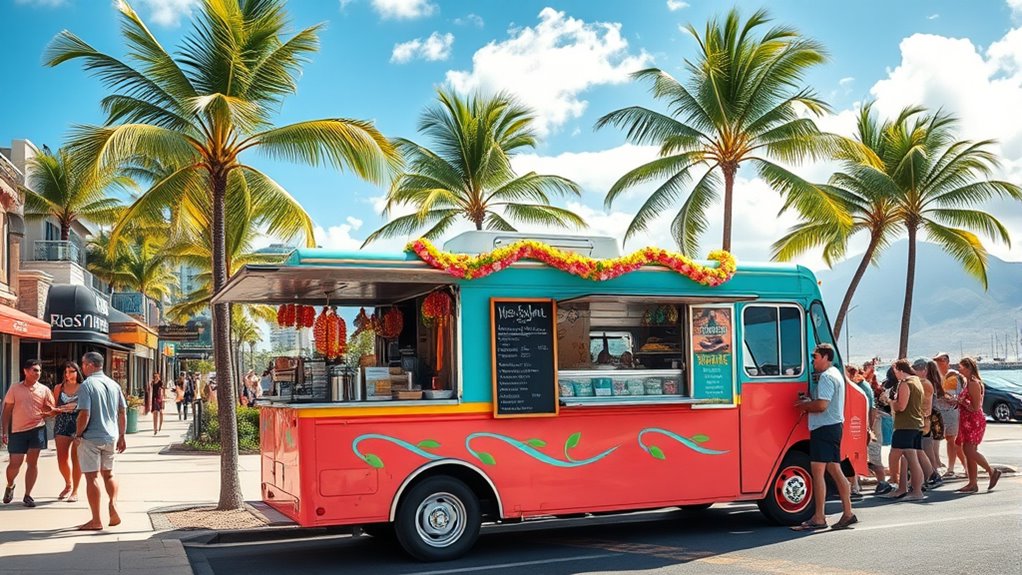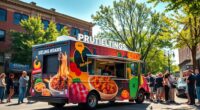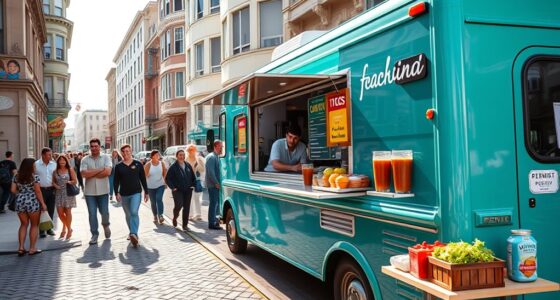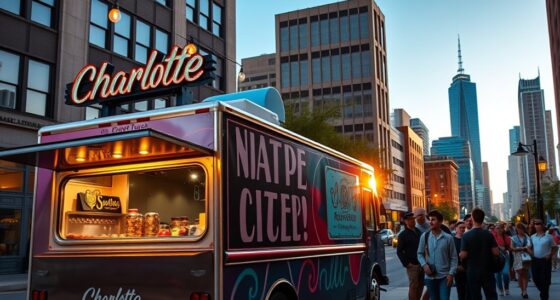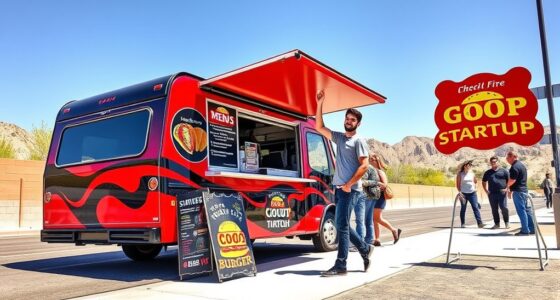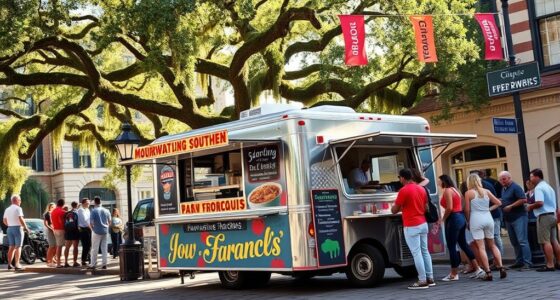To open a food truck in Kailua, Hawaii, you need to obtain multiple permits like the Food Establishment Permit and a Business License, which can cost around $5K–$15K. Start-up costs for your truck and equipment typically range from $50K to $180K. Prime locations include Kailua Town Center and local events. Develop a menu that appeals to locals and tourists, and use social media to attract customers. Keep regulatory compliance in check, and you’ll find success as you explore these steps further.
Key Takeaways
- Obtain necessary permits including Hawaii Business Express registration, Food Establishment Permit, and temporary event permits, with costs around $5K–$15K.
- Budget for vehicle ($30K–$100K new, $50K–$175K used), equipment ($30K–$80K), and initial inventory ($5K–$10K).
- Choose high-traffic locations like Kailua Town Center, festivals, and beach neighborhoods; develop a menu suited for mobile service.
- Ensure staff have Hawaii Food Handler Cards, follow strict food safety standards, and operate from approved support kitchens.
- Promote via social media platforms, partner with local events, and engage customers with authentic content and loyalty programs.
Navigating Permits and Licenses for Kailua Food Trucks
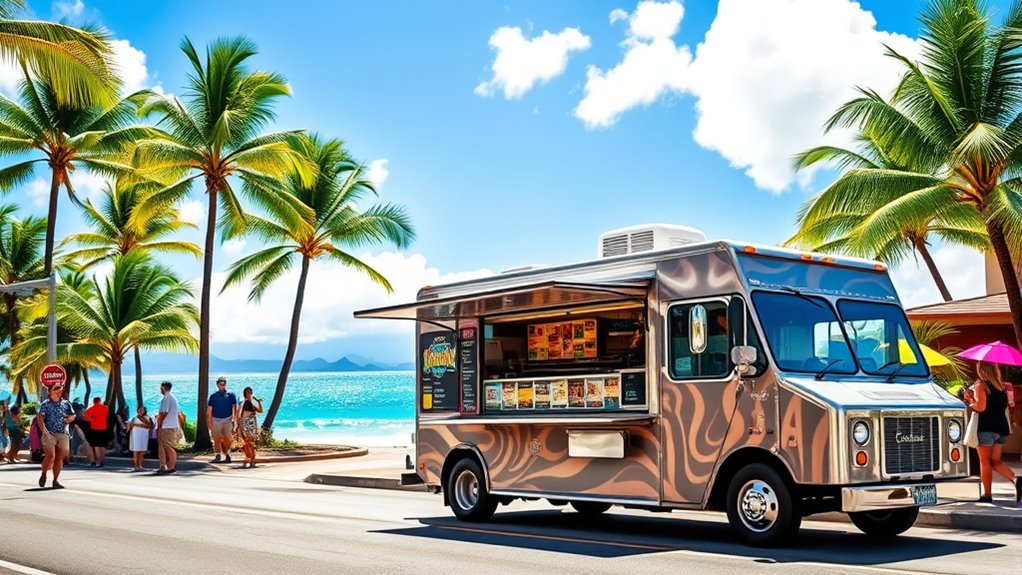
Are you ready to start your food truck business in Kailua? First, you’ll need to register your business through Hawaii Business Express, which costs only $20. Then, secure a City and County of Honolulu Business License specific to food trucks. Register with the Department of Taxation for GET and use tax filings, all free of charge. If you plan to hire staff, get an Employer Identification Number and register for State Tax Withholding. A valid driver’s license for your truck’s size and type is mandatory. Additionally, apply for a Food Establishment Permit from the Hawaii Department of Health, costing $100–$400 depending on your operation. Don’t forget to obtain a Mobile Food Vendor Permit and ensure your vehicle registration and insurance are current. These steps set the foundation for legal, compliant operations in Kailua. Obtaining all necessary permits and licenses ensures your food truck operates legally and avoids potential fines or shutdowns. Understanding local regulations can help you stay compliant and avoid penalties as you launch your business.
Understanding the Cost Structure for Starting Your Food Truck Business
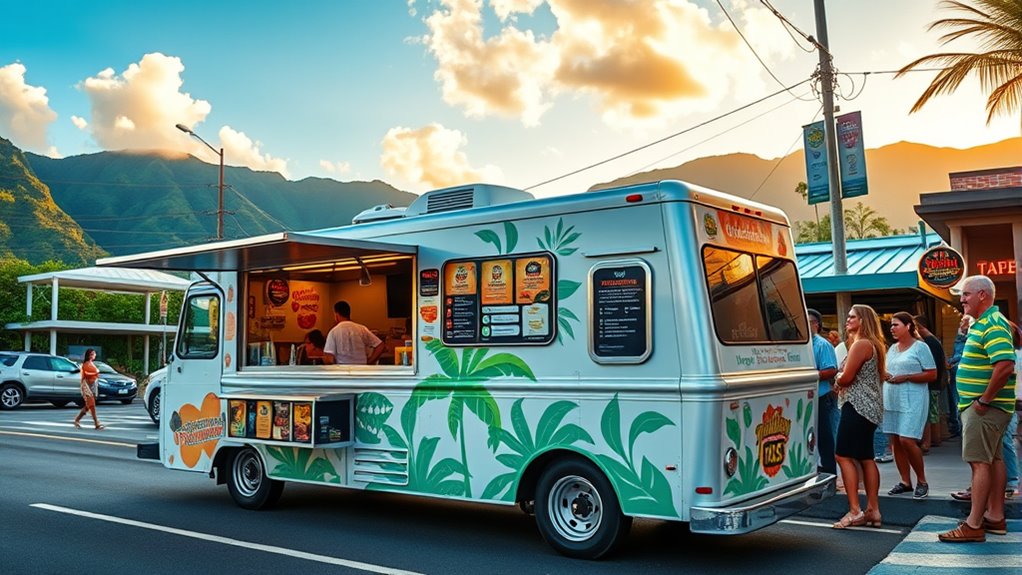
Starting a food truck business in Kailua involves careful planning of your initial costs to guarantee a smooth launch. Vehicle costs vary widely: a new truck can range from $30,000 to $100,000, while used models cost between $50,000 and $175,000 depending on condition and customization. Leasing is an option, with monthly payments around $2,000 to $3,000. You’ll also need $30,000 to $80,000 for kitchen equipment like grills and refrigerators. Don’t forget to budget for permits and licenses, which typically cost $5,000 to $15,000. Initial inventory expenses, including ingredients and supplies, usually run $5,000 to $10,000. Marketing, branding, and promotional efforts will likely require $3,000 to $8,000. Finally, set aside $15,000 to $30,000 for working capital to cover early operational costs. Understanding local licensing requirements can help prevent delays in your launch process and ensure compliance with regulatory standards.
Best Locations and Event Opportunities in Kailua
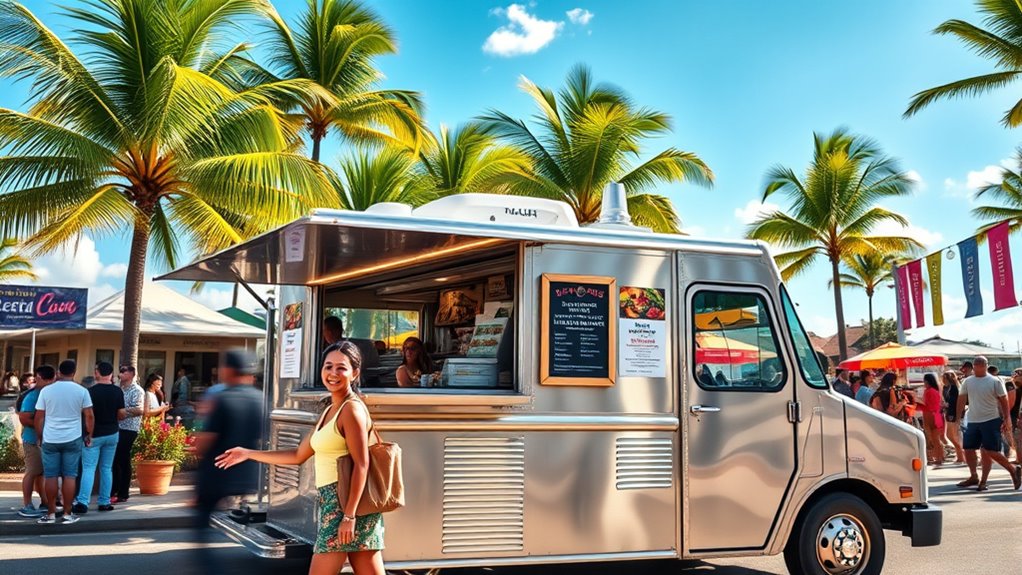
Kailua offers several prime locations and event opportunities that can substantially boost your food truck’s visibility and sales. Historic Kailua Village is a bustling hub with high foot traffic and frequent events, making it ideal for exposure. Kailua Town Center’s ample parking and steady flow of locals and tourists during the farmers’ market provide reliable customer traffic. Office parks and corporate campuses are perfect for weekday lunch crowds and catering. Open parking lots, like target lots, can host weekly or special gatherings, inspiring similar setups in Kailua. Residential neighborhoods near beaches offer evening or weekend opportunities for locals and tourists relaxing outdoors. Participating in events like the Street Eats Food Truck Festival and weekly farmers’ markets can further elevate your brand and attract diverse audiences. Incorporating essential oils into your offerings or marketing can also create a memorable experience for customers seeking relaxation and wellness.
Developing a Menu and Ensuring Food Safety Compliance
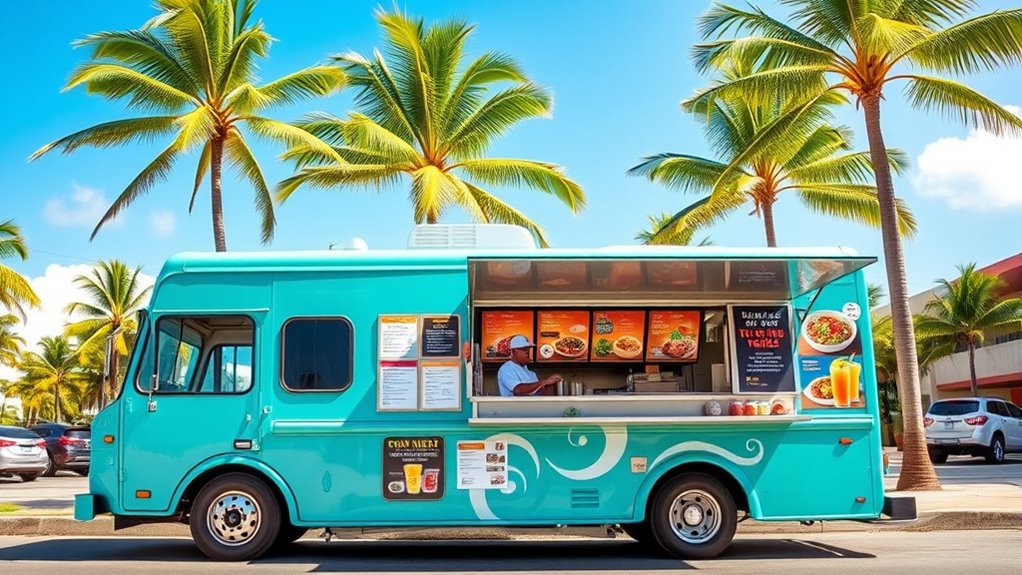
You need to develop a menu that reflects local tastes and offers options for various dietary needs while staying manageable for your mobile setup. Ensuring your food preparation facilities meet health department standards is vital, so use approved kitchens and equipment. Additionally, obtaining food handler certification helps you stay compliant with safety regulations and maintain customer trust.
Menu Variety Requirements
Developing a menu for a food truck involves carefully aligning your offerings with the support kitchen’s capacity and the mobile unit’s equipment. Your menu must be reviewed during the permit plan submission to guarantee it’s feasible and compliant. The Hawaii health department considers menu complexity when setting permit fees, so choose your items wisely. To stay compliant, your menu should include only items your support kitchen can safely prepare, store, and transport. Also, all staff handling food need certified food safety training. Here are key points to remember:
- Your menu must match your support kitchen’s capabilities and equipment.
- Include diverse items only if your setup supports safe preparation.
- Ensure hand-washing facilities are available for open foods.
- Any menu changes require updated plans and potential permit adjustments.
- Be aware of the safe food handling practices to prevent cross-contamination and ensure compliance with health regulations.
Approved Food Preparation Facilities
Ensuring your menu aligns with approved food preparation facilities is essential for maintaining food safety and compliance. You must use a Food Establishment Permit issued by the Hawaii Department of Health (DOH) for your support kitchen, which must be capable of supporting mobile food operations. Foods prepared there are used to supplement the truck’s production, and cooking or handling outside the MFE is prohibited unless in the support kitchen. Your support kitchen operator must sign agreements allowing MFE use under health regulations. All equipment inside your mobile unit must be built-in, including a handwash sink, potable water tanks (minimum 5 gallons), and proper waste disposal. Maintaining temperature controls, plan approval, and sanitation standards are mandatory for ongoing compliance and safety. Proper documentation and agreements ensure your operation’s legality and adherence to Hawaii’s food safety laws. Additionally, monitoring recent market trends can help you stay informed about any regulatory changes affecting food truck operations.
Food Handler Certification Needed
Creating a safe and compliant menu for your food truck in Kailua, Hawaii, requires more than just selecting appealing dishes; it also involves meeting food safety regulations. To do this, you must obtain a Hawaii Food Handler Card, which is mandatory for all food workers handling, preparing, or serving food. Here’s what you need to know:
- Complete an ANSI-accredited training course, online or in person. Courses are available from multiple providers, ensuring flexibility and accessibility.
- Pass the exam with at least 70%, which typically takes about 75 minutes.
- Ensure at least one employee with a valid card is present during all operational hours.
- Renew your certification every three years through updated training.
- Staying informed about food safety regulations and best practices is essential for maintaining compliance and protecting customers.
Holding a valid Food Handler Card helps prevent foodborne illnesses and guarantees your truck stays compliant with Hawaii’s health standards.
Effective Marketing Strategies to Attract Customers
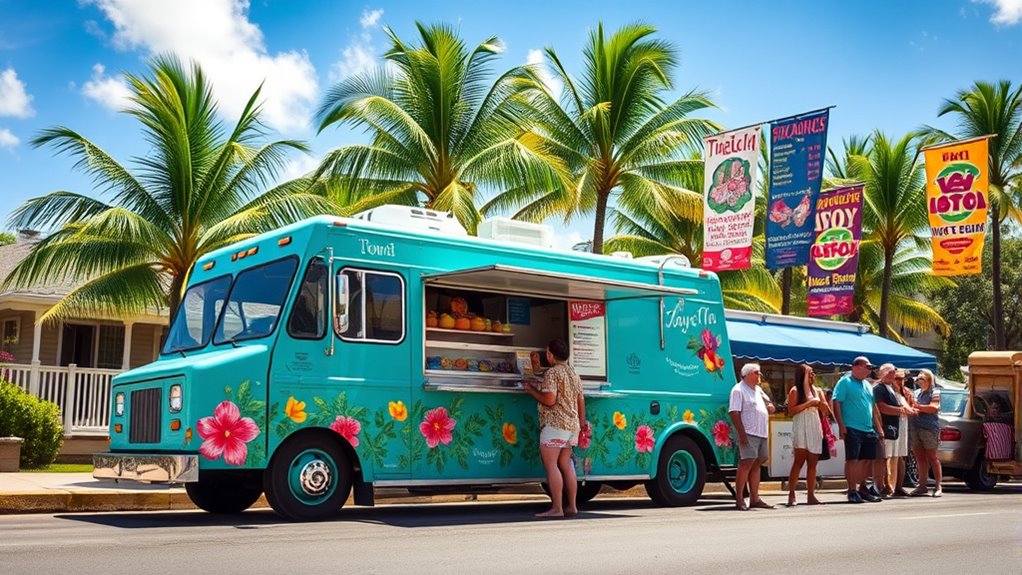
To attract more customers to your food truck in Kailua, leveraging effective marketing strategies is essential. Use Instagram to showcase high-quality food photos and share your real-time locations, appealing to both locals and tourists. Engage your community on Facebook with event updates and customer interactions. TikTok offers a chance to share behind-the-scenes content and participate in viral food trends, boosting your visibility. Optimize your Google My Business profile to improve local search results and attract nearby diners. Regularly update social media with your current locations and partner with local events, festivals, and businesses for cross-promotions. Sharing your story and unique flavors helps build an emotional connection. Incorporate exclusive offers at events and implement loyalty programs to encourage repeat visits and grow your customer base. Additionally, over 40% of food truck consumers are under age 45, so tailoring your online content to appeal to a younger demographic can significantly increase engagement. Understanding narcissistic behavior and engaging authentically with your audience can also foster trust and loyalty, setting your food truck apart in a competitive market.
Managing Regulations and Operational Requirements
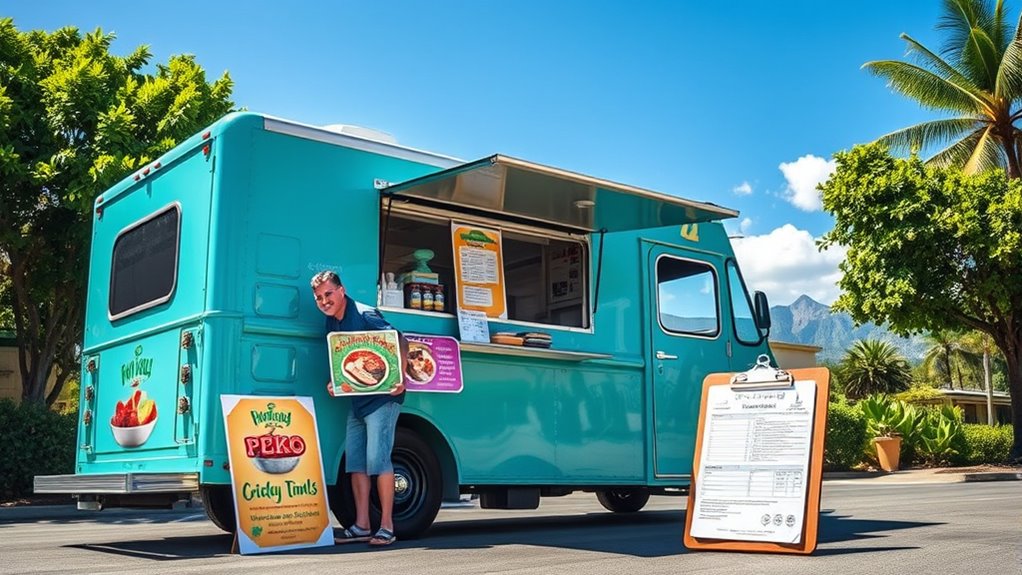
To keep your food truck running smoothly in Kailua, you need to follow health inspection rules and stay compliant with local regulations. It’s essential to understand the specific event and zoning requirements so you avoid fines or shutdowns. Staying organized and informed helps you meet safety standards and operate without interruptions.
Compliance With Health Inspections
Making sure compliance with health inspections is crucial for food truck operators in Kailua, Hawaii, as it involves adhering to strict regulations designed to protect public health. To pass inspections, you need to focus on several key areas:
- Proper Equipment: Install a three-compartment sink, handwashing stations with hot water, and durable water tanks for cleaning and food prep. Modern equipment ensures efficient sanitation and compliance.
- Food Storage: Keep all supplies at least 6 inches off the floor, label items with names and dates, and practice FIFO to prevent spoilage.
- Temperature Control: Maintain cold foods below 41°F and hot foods above 135°F, with regular temperature logs to demonstrate compliance.
- Pest Control: Implement measures like screens and proper garbage storage to prevent pest entry and ensure cleanliness.
Adherence to Event Rules
Managing compliance with event rules is vital for food truck operators in Kailua, Hawaii, as it guarantees smooth participation and avoids penalties or disqualification. You must apply for a Temporary Food Establishment Permit at least two weeks before the event, with all payments made online via credit card. Confirm your insurance and permits are prominently displayed during the event. You’re required to stay for the entire event duration, with setup allowed 30 minutes to an hour before start and breakdown after the event ends, often after 6 pm. Manage waste responsibly, following Hawaii’s Disposable Food Waste Ordinance, and use eco-friendly packaging. Comply with fire safety standards by carrying a certified fire extinguisher, and adhere to zoning and parking regulations. For designated locations, secure a Special Activity Permit, including necessary documentation and liability agreements. Additionally, selecting a preppy name for your food truck can help establish a stylish and memorable brand identity that appeals to a trendy clientele.
Frequently Asked Questions
Can I Operate a Food Truck From My Private Residence in Kailua?
You can’t operate a food truck from your private residence in Kailua. County ordinances restrict mobile food vendors to designated public locations, and operating on private property likely violates zoning laws. You’ll need permits for public or commercial spaces, not residential zones. Plus, operating from home raises issues with waste, parking, and safety. To run a food truck legally, focus on public sites or approved events, not your private residence.
Are There Specific Health Inspections Required for Each Menu Item?
Did you know that over 48 million people get sick from foodborne illnesses annually? When it comes to health inspections, you don’t need to worry about each menu item individually. Instead, inspectors evaluate overall food handling risks, focusing on proper storage, temperature control, and contamination prevention for your entire menu. Ensuring your truck meets these standards helps keep your customers safe and your operation compliant.
How Do I Find Support Kitchens Approved by the Hawaii Department of Health?
To find approved support kitchens, you should contact the Hawaii Department of Health (DOH) Sanitation Branch or visit their official website. They maintain a list of facilities with current Food Establishment Permits suitable for support kitchens. You can also verify kitchens by checking their inspection history, ensuring they meet sanitation standards. Local county resources and certified commercial kitchens are reliable options for finding compliant support kitchens that suit your food truck needs.
What Are the Insurance Requirements for Food Truck Operations in Kailua?
Think of insurance as your shield in Kailua’s bustling food scene. You’re legally required to carry commercial auto insurance, with minimum limits like $20,000 per person for bodily injury. Worker’s comp and general liability are also essential, protecting you from costly claims. Consider additional coverages like equipment or product liability. Keep your policy current, provide proof when needed, and remember, extensive coverage keeps your operation resilient against unforeseen setbacks.
Is Alcohol Sales Permitted on Food Trucks in Kailua?
You’re wondering if alcohol sales are permitted on food trucks in Kailua. While permanent licenses aren’t available, you can sell alcohol temporarily during specific events with a short-term permit. These permits, costing $150 to $1,200, allow sales only at approved locations and times. You must follow strict licensing laws, guarantee responsible sales, and obtain proper permits for each event. Regular sales of alcohol outside these permits aren’t legally permitted.
Conclusion
Starting your food truck in Kailua isn’t just about permits or locations—it’s about embracing the island’s vibrant community and serendipitous moments. When you serve authentic flavors with passion, the right opportunity often finds you, just like a breeze guiding your truck to enthusiastic customers. Trust the process, stay adaptable, and remember, sometimes success comes when you least expect it—mirroring Kailua’s own effortless charm. Your journey begins where preparation meets a little island magic.
